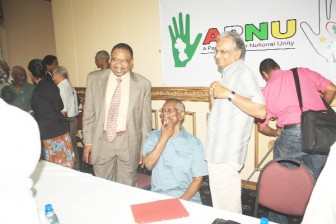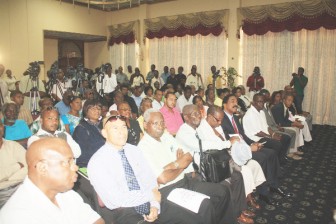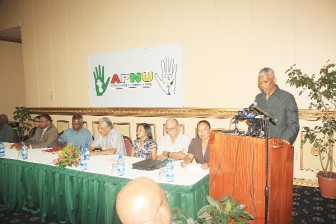David Granger will lead the Joint Opposition Political Parties (JOPP) into the upcoming general elections under the banner of A Partnership for National Unity (APNU), which will present a single list of candidates.
It was announced yesterday that JOPP has transitioned into APNU and an official launch of the new partnership is set for July 8, when other major announcements are expected to be made, including who will assume the role of Prime Ministerial Candidate.

With Granger as the consensus presidential candidate, the APNU will contest the elections with a single Representative and Deputy Representative of the List of Candidates, in addition to a common symbol; an agreed electoral platform; and a unified campaign organization and management.
Granger, the PNCR presidential nominee and an early favourite to lead JOPP, decried the state of affairs in the country when he addressed the capacity crowd assembled at the Pegasus Hotel yesterday.
“Guyana is at breaking point after nearly nineteen years of PPP one-party rule. Our country, today, is on the way to becoming a narco-state. Daily armed robberies, domestic violence, banditry in the hinterland, piracy on the coastland and arson and murder in our communities have scarred our society,” he said.
He continued: “Poverty and unemployment have created an army of beggars, drug addicts, lunatics, destitute people, wandering girls and street children. University graduates, talented teachers and nurses, and thousands of ordinary citizens race to migrate in droves from their homeland”.
APNU seeks to promote real development, Granger said, adding that development is not calculated by the accumulation of cars on the roads or the height of houses in the suburbs. Development is measured by workers who earn a liveable wage and women, girl children and vulnerable persons who are safe in their homes, he added.

APNU has taken the first step on the long and hard road to restart the unfinished work of those who fought for independence, Granger added. He also asserted that a unified nation is not possible if “the coastland succeeds but the hinterland suffers; when the lawless flourish while the righteous perish; or when an oligarchy prospers while the common people remain mired in poverty and despair.”
He thanked JOPP for choosing him as the Presidential Candidate, saying, “I shall not disappoint the Guyanese people” to thunderous applause. After his declaration, a supporter seated in the audience shouted, “We know, we know!” The atmosphere was electric whenever Granger’s name was mentioned yesterday, with people applauding and in the case of others, vocally endorsing Granger for the JOPP position.
JOPP said in a statement that the APNU will soon identify and announce the candidates who would be put forward for the various lists required for general and regional elections, adding that a leadership core led by Granger and consisting of four nominees, one from each of the member parties of JOPP, is in the process of being established.
Not a political party
JOPP explained that the APNU is not a political party, but an association of political parties, Guyanese organisations and citizens that share a common desire and are guided by a Statement of Principles.

The APNU declaration which was released and read by WPA Co-leader Dr. Rupert Roopnaraine, said the group is currently united in the belief that the impending election provides an opportunity for citizens to embark on a credible and open process that will begin to end the bitterness that has divided the society and choked development efforts.
“We reject the view that elections must translate into an ethnic census, thereby creating a double jeopardy for our society: on the one hand, rewards for a particular racial group; on the other, exclusion of others from efforts that contribute to tolerance, justice, growth and development,” Roopnaraine said.
Roopnaraine said APNU is aware that societies which pander to the worst divisive instincts of voters foster intolerance and fail to mobilize the strengths of their citizens in the case of justice, growth and development. In establishing a Government of National Unity, he said the APNU is committed to a number of things, including the constitutional and institutional reforms necessary for the realization of shared governance; national reconciliation; the reconstitution of the Integrity Commission and the Ethnic Relations Commission and forensic audit of state organizations. Roopnaraine said too that the constitutional reforms also include making the Head of State accountable to the National Assembly.
A new beginning
Opposition Leader Robert Corbin called the APNU a “new beginning,” noting that the Central Executive Committee of his party has, by a unanimous resolution, authorized him to commit the PNCR to membership of the APNU.
“We are equally confident that our APNU consensus Presidential Candidate has the integrity, capacity and the competence to lead …and will ensure that the objectives of APNU are achieved,” Corbin declared.
According to Corbin, there is a general acceptance that the country’s system of governance, since 1953, has failed to provide for the meaningful involvement and full participation of our citizens from decision-making, and that they “are tired of the farce called meaningful consultation”
Economist Professor Clive Thomas briefly remarked that the APNU is the first multi-party grouping, adding that the commitment provides for the inclusion of not only the Partnership, but for all other parties “with a threshold of voter support in the forthcoming elections that are willing” to form a Government of National Unity.
Leader of the NFA, Keith Scott and GAP MP Everall Franklin also spoke at the event. Both underscored the shared vision and common goals of the Partnership. Peter Ramsaroop’s Guyana People’s Partnership is also part of the APNU.








